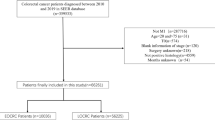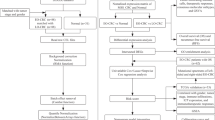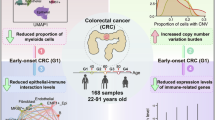Abstract
Background
Despite a reduction of both incidence and mortality from CRC, recent studies have shown an increase in the incidence of early-onset CRC (EO-CRC). Data on this setting are limited. The aim of our study was to evaluate the clinical and molecular profiles of metastatic EO-CRC patients in order to identify differences compared to a late-onset CRC (LO-CRC) control group.
Methods
We retrospectively collected data from 1272 metastatic colorectal cancers from 5 different Italian Institutions. The main objective was to the evaluate clinical outcome for EO-CRC patients in comparison to patients included in the control group.
Results
In the overall population, mOS was 34,7 in EO-CRC pts vs 43,0 months (mo) (p < 0,0001). In the RAS/BRAF mutated subgroup mOS in EO-CRC pts was 30,3 vs 34,0 mo (p = 0,0156). In RAS/BRAF wild-type EO-CRC mOS was 43,0 vs 50,0 mo (p = 0,0290). mPFS was 11,0 in EO-CRC pts vs 14,0 mo (p < 0,0001).
Conclusion
Findings indicate a general worse prognosis for patients with early-onset colorectal cancer compared to late-onset patients. Interestingly this seems to occur regardless of the molecular status. These observations might have a considerable impact on clinical practice and research.
This is a preview of subscription content, access via your institution
Access options
Subscribe to this journal
Receive 24 print issues and online access
$259.00 per year
only $10.79 per issue
Buy this article
- Purchase on SpringerLink
- Instant access to the full article PDF.
USD 39.95
Prices may be subject to local taxes which are calculated during checkout






Similar content being viewed by others
Data availability
Datasets generated during and/or analyzed during the current study are available from the corresponding author on reasonable request.
References
Bray F, Ferlay J, Soerjomataram I, Siegel RL, Torre LA, Jemal A. Global cancer statistics 2018: GLOBOCAN estimates of incidence and mortality worldwide for 36 cancers in 185 countries. CA Cancer J Clin. 2018;68:394–424.
Siegel RL, Miller KD, Fuchs HE, Jemal A. Cancer statistics, 2022. CA Cancer J Clin. 2022;72:7–33. https://doi.org/10.3322/caac.21708.
Akimoto N, Ugai T, Zhong R, Hamada T, Fujiyoshi K, Giannakis M, et al. Rising incidence of early-onset colorectal cancer - a call to action. Nat Rev Clin Oncol. 2021;18:230–43. https://doi.org/10.1038/s41571-020-00445-1.
Araghi M, Soerjomataram I, Bardot A, Ferlay J, Cabasag CJ, Morrison DS, et al. Changes in colorectal cancer incidence in seven high-income countries: a population-based study. Lancet Gastroenterol Hepatol. 2019;4:511–8.
Siegel RL, Fedewa SA, Anderson WF, Miller KD, Ma J, Rosenberg PS, et al. Colorectal cancer incidence patterns in the United States, 1974-2013. J Natl Cancer Inst. 2017;109:djw322 https://doi.org/10.1093/jnci/djw322.
Bailey CE, Hu CY, You YN, Bednarski BK, Rodriguez-Bigas MA, Skibber JM, et al. Increasing disparities in the age-related incidences of colon and rectal cancers in the United States, 1975-2010. JAMA Surg. 2015;150:17–22. https://doi.org/10.1001/jamasurg.2014.1756.
Feletto E, Yu XQ, Lew JB, St John DJB, Jenkins MA, Macrae FA, et al. Trends in colon and rectal cancer incidence in Australia from 1982 to 2014: analysis of data on over 375,000 cases. Cancer Epidemiol Biomarkers Prev. 2019;28:83–90. https://doi.org/10.1158/1055-9965.EPI-18-0523.
Brenner DR, Ruan Y, Shaw E, De P, Heitman SJ, Hilsden RJ. Increasing colorectal cancer incidence trends among younger adults in Canada. Prev Med. 2017;105:345–9. https://doi.org/10.1016/j.ypmed.2017.10.007.
Larsen IK, Bray F. Trends in colorectal cancer incidence in Norway 1962-2006: an interpretation of the temporal patterns by anatomic subsite. Int J Cancer. 2010;126:721–32. https://doi.org/10.1002/ijc.24839.
Araghi M, Soerjomataram I, Bardot A, Ferlay J, Cabasag CJ, Morrison DS, et al. Changes in colorectal cancer incidence in seven high-income countries: a population-based study. Lancet Gastroenterol Hepatol. 2019;4:511–8. https://doi.org/10.1016/S2468-1253(19)30147-5.
Siegel RL, Miller KD, Goding Sauer A, Fedewa SA, Butterly LF, Anderson JC, et al. Colorectal cancer statistics, 2020. CA Cancer J Clin. 2020;70:145–64. https://doi.org/10.3322/caac.21601.
REACCT Collaborative, Zaborowski AM, Abdile A, Adamina M, Aigner F, d’Allens L, Allmer C, et al. Characteristics of early-onset vs late-onset colorectal cancer: a review. JAMA Surg. 2021;156:865–74. https://doi.org/10.1001/jamasurg.2021.2380.
Bhandari A, Woodhouse M, Gupta S. Colorectal cancer is a leading cause of cancer incidence and mortality among adults younger than 50 years in the USA: a SEER-based analysis with comparison to other young-onset cancers. J Investig Med. 2017;65:311–5. https://doi.org/10.1136/jim-2016-000229.
Chen FW, Sundaram V, Chew TA, Ladabaum U. Advanced-stage colorectal cancer in persons younger than 50 years not associated with longer duration of symptoms or time to diagnosis. Clin Gastroenterol Hepatol. 2017;15:728–37.e3. https://doi.org/10.1016/j.cgh.2016.10.038.
Sandhu GS, Anders R, Walde A, Leal AD, Teng King G, Leong S, et al. High incidence of advanced stage cancer and prolonged rectal bleeding history before diagnosis in young-onset patients with colorectal cancer. J Clin Oncol. 2019;37:3576
Yarden RI, Newcomer KL; Never Too Young Advisory Board, Colorectal Cancer Alliance. Young onset colorectal cancer patients are diagnosed with advanced disease after multiple misdiagnoses. 2019 AACR Annual Meeting, Atlanta, GA; 2019.
Liu PH, Wu K, Ng K, Zauber AG, Nguyen LH, Song M, et al. Association of obesity with risk of early-onset colorectal cancer among women. JAMA Oncol. 2019;5:37–44. https://doi.org/10.1001/jamaoncol.2018.4280.
Jensen BW, Bjerregaard LG, Ängquist L, Gögenur I, Renehan AG, Osler M, et al. Change in weight status from childhood to early adulthood and late adulthood risk of colon cancer in men: a population-based cohort study. Int J Obes. 2018;42:1797–803. https://doi.org/10.1038/s41366-018-0109-y.
Zhang J, Haines C, Watson AJM, Hart AR, Platt MJ, Pardoll DM, et al. Oral antibiotic use and risk of colorectal cancer in the United Kingdom, 1989-2012: a matched case-control study. Gut. 2019;68:1971–8. https://doi.org/10.1136/gutjnl-2019-318593.
Akimoto N, Ugai T, Zhong R, Hamada T, Fujiyoshi K, Giannakis M, et al. Rising incidence of early-onset colorectal cancer - a call to action. Nat Rev Clin Oncol. 2021;18:230–43. https://doi.org/10.1038/s41571-020-00445-1.
Eng C, Jácome AA, Agarwal R, Hayat MH, Byndloss MX, Holowatyj AN, et al. A comprehensive framework for early-onset colorectal cancer research. Lancet Oncol. 2022;23:e116–28. https://doi.org/10.1016/S1470-2045(21)00588-X.
Abdelsattar ZM, Wong SL, Regenbogen SE, Jomaa DM, Hardiman KM, Hendren S. Colorectal cancer outcomes and treatment patterns in patients too young for average-risk screening. Cancer. 2016;122:929–34. https://doi.org/10.1002/cncr.29716.
Teng A, Lee DY, Cai J, Patel SS, Bilchik AJ, Goldfarb MR. Patterns and outcomes of colorectal cancer in adolescents and young adults. J Surg Res. 2016;205:19–27. https://doi.org/10.1016/j.jss.2016.05.036.
Georgiou A, Khakoo S, Edwards P, Minchom A, Kouvelakis K, Kalaitzaki E, et al. Outcomes of patients with early onset colorectal cancer treated in a UK Specialist Cancer Center. Cancers. 2019;11:1558. https://doi.org/10.3390/cancers11101558.
Liang JT, Huang KC, Cheng AL, Jeng YM, Wu MS, Wang SM. Clinicopathological and molecular biological features of colorectal cancer in patients less than 40 years of age. Br J Surg. 2003;90:205–14. https://doi.org/10.1002/bjs.4015.
Chang DT, Pai RK, Rybicki LA, Dimaio MA, Limaye M, Jayachandran P, et al. Clinicopathologic and molecular features of sporadic early-onset colorectal adenocarcinoma: an adenocarcinoma with frequent signet ring cell differentiation, rectal and sigmoid involvement, and adverse morphologic features. Mod Pathol. 2012;25:1128–39. https://doi.org/10.1038/modpathol.2012.61.
You YN, Xing Y, Feig BW, Chang GJ, Cormier JN. Young-onset colorectal cancer: is it time to pay attention? Arch Intern Med. 2012;172:287–9. https://doi.org/10.1001/archinternmed.2011.602.
Cercek A, Chatila WK, Yaeger R, Walch H, Fernandes GDS, Krishnan A, et al. A comprehensive comparison of early-onset and average-onset colorectal cancers. J Natl Cancer Inst. 2021;113:1683–92. https://doi.org/10.1093/jnci/djab124.
Sinicrope FA. Increasing incidence of early-onset colorectal cancer. N Engl J Med. 2022;386:1547–58. https://doi.org/10.1056/NEJMra2200869.
Kirzin S, Marisa L, Guimbaud R, De Reynies A, Legrain M, Laurent-Puig P, et al. Sporadic early-onset colorectal cancer is a specific sub-type of cancer: a morphological, molecular and genetics study. PLoS ONE. 2014;9:e103159. https://doi.org/10.1371/journal.pone.0103159.
Lieu CH, Golemis EA, Serebriiskii IG, Newberg J, Hemmerich A, Connelly C, et al. Comprehensive genomic landscapes in early and later onset colorectal cancer. Clin Cancer Res. 2019;25:5852–8. https://doi.org/10.1158/1078-0432.CCR-19-0899.
Lieu CH, Renfro LA, de Gramont A, Meyers JP, Maughan TS, Seymour MT, et al. Association of age with survival in patients with metastatic colorectal cancer: analysis from the ARCAD Clinical Trials Program. J Clin Oncol. 2014;32:2975–84. https://doi.org/10.1200/JCO.2013.54.9329.
Meyer JE, Narang T, Schnoll-Sussman FH, Pochapin MB, Christos PJ, Sherr DL. Increasing incidence of rectal cancer in patients aged younger than 40 years: an analysis of the surveillance, epidemiology, and end results database. Cancer. 2010;116:4354–9. https://doi.org/10.1002/cncr.25432.
Glover M, Mansoor E, Panhwar M, Parasa S, Cooper GS. Epidemiology of colorectal cancer in average risk adults 20-39 years of age: a population-based national study. Dig Dis Sci. 2019;64:3602–9. https://doi.org/10.1007/s10620-019-05690-8.
Kneuertz PJ, Chang GJ, Hu CY, Rodriguez-Bigas MA, Eng C, Vilar E, et al. Overtreatment of young adults with colon cancer: more intense treatments with unmatched survival gains. JAMA Surg. 2015;150:402–9. https://doi.org/10.1001/jamasurg.2014.3572.
Saraste D, Järås J, Martling A. Population-based analysis of outcomes with early-age colorectal cancer. Br J Surg. 2020;107:301–9. https://doi.org/10.1002/bjs.11333.
Ben-Ishay O, Brauner E, Peled Z, Othman A, Person B, Kluger Y. Diagnosis of colon cancer differs in younger versus older patients despite similar complaints. Isr Med Assoc J. 2013;15:284–7.
Dozois EJ, Boardman LA, Suwanthanma W, Limburg PJ, Cima RR, Bakken JL, et al. Young-onset colorectal cancer in patients with no known genetic predisposition: can we increase early recognition and improve outcome? Medicine. 2008;87:259–3. https://doi.org/10.1097/MD.0b013e3181881354.
Tsilimigras DI, Ntanasis-Stathopoulos I, Bagante F, Moris D, Cloyd J, Spartalis E, et al. Clinical significance and prognostic relevance of KRAS, BRAF, PI3K and TP53 genetic mutation analysis for resectable and unresectable colorectal liver metastases: a systematic review of the current evidence. Surg Oncol. 2018;27:280–8. https://doi.org/10.1016/j.suronc.2018.05.012.
Rhaiem R, Duramé A, Primavesi F, Dorcaratto D, Syn N, Rodríguez ÁH, et al. Critical appraisal of surgical margins according to KRAS status in liver resection for colorectal liver metastases: should surgical strategy be influenced by tumor biology? Surgery. 2024;176:124–33. https://doi.org/10.1016/j.surg.2024.02.008.
Blanke CD, Bot BM, Thomas DM, Bleyer A, Kohne CH, Seymour MT, et al. Impact of young age on treatment efficacy and safety in advanced colorectal cancer: a pooled analysis of patients from nine first-line phase III chemotherapy trials. J Clin Oncol. 2011;29:2781–6. https://doi.org/10.1200/JCO.2010.33.5281.
Chung YF, Eu KW, Machin D, Ho JM, Nyam DC, Leong AF, et al. Young age is not a poor prognostic marker in colorectal cancer. Br J Surg. 1998;85:1255–9. https://doi.org/10.1046/j.1365-2168.1998.00805.x.
Schellerer VS, Merkel S, Schumann SC, Schlabrakowski A, Förtsch T, Schildberg C, et al. Despite aggressive histopathology survival is not impaired in young patients with colorectal cancer : CRC in patients under 50 years of age. Int J Colorectal Dis. 2012;27:71–9. https://doi.org/10.1007/s00384-011-1291-8.
McMillan DC, McArdle CS. The impact of young age on cancer-specific and non-cancer-related survival after surgery for colorectal cancer: 10-year follow-up. Br J Cancer. 2009;101:557–60. https://doi.org/10.1038/sj.bjc.6605222.
Sanford SD, Zhao F, Salsman JM, Chang VT, Wagner LI, Fisch MJ. Symptom burden among young adults with breast or colorectal cancer. Cancer. 2014;120:2255–63. https://doi.org/10.1002/cncr.28297.
Goldvaser H, Purim O, Kundel Y, Shepshelovich D, Shochat T, Shemesh-Bar L, et al. Colorectal cancer in young patients: is it a distinct clinical entity? Int J Clin Oncol. 2016;21:684–95. https://doi.org/10.1007/s10147-015-0935-z.
Vatandoust S, Price TJ, Ullah S, Roy AC, Beeke C, Young JP, et al. Metastatic colorectal cancer in young adults: a study from the South Australian population-based registry. Clin Colorectal Cancer. 2016;15:32–6. https://doi.org/10.1016/j.clcc.2015.07.005.
Wang MJ, Ping J, Li Y, Adell G, Arbman G, Nodin B, et al. The prognostic factors and multiple biomarkers in young patients with colorectal cancer. Sci Rep. 2015;5:10645 https://doi.org/10.1038/srep10645.
Rodriguez L, Brennan K, Karim S, Nanji S, Patel SV, Booth CM. Disease characteristics, clinical management, and outcomes of young patients with colon cancer: a population-based study. Clin Colorectal Cancer. 2018;17:e651–61. https://doi.org/10.1016/j.clcc.2018.06.007.
Author information
Authors and Affiliations
Contributions
Andrea Pretta: Conceptualization, Methodology, Validation, Formal analysis, Investigation, Resources, Data Curation, Writing - Original Draft, Writing - Review & Editing, Visualization. Pina Ziranu: Resources, Data Curation, Formal analysis, Writing - Original Draft, Writing - Review & Editing. Eleonora Perissinotto: Resources, Data Curation. Filippo Ghelardi: Resources, Data Curation. Federica Marmorino: Resources, Data Curation. Riccardo Giampieri: Resources, Data Curation, Formal analysis, Writing - Original Draft, Writing - Review & Editing. Mariangela Puci: Data Curation, Formal analysis. Maria Caterina De Grandis: Resources, Data Curation. Eleonora Lai: Resources. Vincenzo Nasca: Resources, Data Curation. Paolo Ciracì: Resources, Data Curation. Marco Puzzoni: Resources. Krisida Cerma: Resources. Data Curation. Carolina Sciortino: Resources, Data Curation. Ada Taravella: Resources, Data Curation. Gianluca Pretta: Writing - Review & Editing. Lorenzo Giuliani: Resources, Data Curation. Camilla Damonte: Resources, Data Curation. Valeria Pusceddu: Resources, Data Curation. Giovanni Sotgiu: Data Curation, Formal analysis. Rossana Berardi: Resources. Sara Lonardi: Resources, Data Curation. Francesca Bergamo: Resources, Data Curation. Filippo Pietrantonio: Resources, Data Curation. Chiara Cremolini: Resources, Data Curation. Mario Scartozzi: Methodology, Validation, Formal analysis, Resources, Data Curation, Writing - Original Draft, Writing - Review & Editing.
Corresponding author
Ethics declarations
Competing interests
The authors declare no competing interests.
Ethics approval and consent to participate
Ethics Committee approval was obtained for the study (Protocol number 2020/10912 – code: EMIBIOCCOR) from Cagliari Indipendent Ethics Committee and written informed consent was obtained from all participants for their tissues to be utilized for this work. This study was performed in accordance with the study protocol, the ethical principles stated in the Declaration of Helsinki as well as those indicated in the International Conference on Harmonization (ICH) Note for Guidance on Good Clinical Practice (GCP; ICH E6, 1995), and all applicable regulatory requirements.
Additional information
Publisher’s note Springer Nature remains neutral with regard to jurisdictional claims in published maps and institutional affiliations.
Rights and permissions
Springer Nature or its licensor (e.g. a society or other partner) holds exclusive rights to this article under a publishing agreement with the author(s) or other rightsholder(s); author self-archiving of the accepted manuscript version of this article is solely governed by the terms of such publishing agreement and applicable law.
About this article
Cite this article
Pretta, A., Ziranu, P., Perissinotto, E. et al. Early onset metastatic colorectal cancer patients as a distinctive clinical and molecular phenomenon. Br J Cancer 132, 188–194 (2025). https://doi.org/10.1038/s41416-024-02902-5
Received:
Revised:
Accepted:
Published:
Version of record:
Issue date:
DOI: https://doi.org/10.1038/s41416-024-02902-5
This article is cited by
-
Early- vs. late-onset colon cancer: clinicopathological insights and survival outcomes in an East Asian cohort
International Journal of Colorectal Disease (2025)



